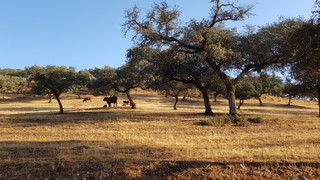Kindly supported by the Graduate School of Geosciences (GSGS), I worked on the proposal for my upcoming research in Andalusia, southern Spain, for three months. Firstly, I screened and reviewed literature, developed research questions and methodologies, and established a first network with researchers in Germany and Spain. Furthermore, I carried out an inspection of the proposed research area.
My PhD research will be directed to the severe decline of oak woodlands (called dehesas) in southern Spain and the analysis of hydro-climatological changes over time. Since the Iberian Peninsula has been recognized as one of the main climate-change hotspots in Europe with high risk potential in future towards increasing temperatures and more frequent drought periods (IPCC, 2014), the overall target of this study is to identify correlations between water availability, drought stress and oak decline. The investigation of water risk potential will contribute to better understand and handle the oak decline and offer first approaches for their conservation. My plan is to apply a multi-methodological approach combining GIS and geoecological field methods. Main focus will lie on the exploration of the effect of drought-periods by executing time series analysis and hydrological in-field measurements concerning tree sap flow and water potential of the tree tissues.
During the funding period, I worked in close consultation with my doctoral supervisor Prof. Dr. Christina Bogner on my proposal for a PhD scholarship. In this context, I created different working packages which represent the proposed papers that will be part of my thesis. Furthermore, I gathered i. a. knowledge from literature about measuring of water flow dynamics on tree level with sap flow measurement loggers and the so-called scholander pressure chamber. I plan to carry out these measurements and compare the resulting time series with records of climate and land-use-change, e.g. from Landsat images.
Due to the funding I had the opportunity to work with two researchers (Dr. Nora Tilly and Ulrike Lussem) from the working group ‘GIS & Remote Sensing’ of the University of Cologne (directed by Prof. Dr. Bareth) on a typical Spanish dehesa. During the one-week-stay in September, I received first impressions of the ecosystem and the extent of its decline. During this field campaign I assisted in mapping of healthy and sick trees and prepared ground control points for satellite images which will be used for the preparation of terrain models and to calculate different biological and hydroclimatological indices. Talking to the co-founder of the foundation ‘Fundación Monte Mediterráneo’ and manager of the Dehesa San Francisco, Ernestine Lüdecke, I not only learned a lot about the high nature value of dehesas, but also about their high vulnerability. Additionally, I built up a network with further researchers from the University of Huelva and Universidad Politécnica de Madrid. As the Dehesa San Francisco is a well-established research camp for scientists from the University of Cologne but also from all over Europe, I plan to broaden my scientific knowledge and network at this place in future campaigns.
I would like to thank the GSGS for the generous grant. I would also like to thank Prof. Dr. Christina Bogner, Prof. Dr. Bareth and Dr. Nora Tilly from the University of Cologne for their supervision, scientific input and their openness towards new ideas and methods. Furthermore, I am grateful to Ernestine Lüdecke for interesting conversations and for offering me accommodation during the one-week-stay on her dehesa.
Fabian Reddig
PhD student
Institute of Geography
Professor Dr. Christina Bogner (working group)
PhD project: Mediterranean cork oak decline in a climate change hotspot: exploration and analysis of hydro-climatological drought factors on the Iberian Peninsula. (working title)
